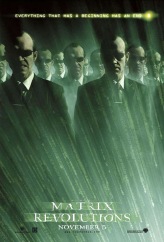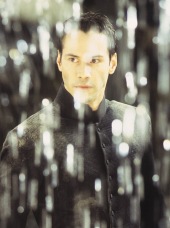|
The Matrix Revolutions
|
| |
 |
USA, 2003. Rated R. 138 minutes.
Cast:
Keanu Reeves, Carrie-Anne Moss, Lawrence Fishburne, Hugo Weaving, Jada
Pinkett-Smith, Mary Alice, Collin Chou, Harold Perrineau, Lambert Wilson,
Ian Bliss, Clayton Watson, Nathaniel Lees
Writers: The Wachowski Brothers
Original Music: Don Davis (score)
Cinematography: Bill Pope
Producers: Grant Hill, Joel Silver
Directors: The Wachowski Brothers
|
 f
you're expecting The Matrix Revolutions to be bad, good. It is. If you're
expecting The Matrix Revolutions to be good, bad. Forget about revolutionary
action sequences and deep philosophical meanings, abstract concepts and bullet-time,
Neo and Trinity—any of the main characters—and the promise of more
Monica Bellucci.
f
you're expecting The Matrix Revolutions to be bad, good. It is. If you're
expecting The Matrix Revolutions to be good, bad. Forget about revolutionary
action sequences and deep philosophical meanings, abstract concepts and bullet-time,
Neo and Trinity—any of the main characters—and the promise of more
Monica Bellucci.
The Matrix Revolutions is far from being The
Matrix, far from being even The
Matrix Reloaded. If you cannot bring yourself to imagine The Matrix
Revolutions is as bad as the cutting reviews have said, the first fifteen
minutes will do the job for you. Here Neo (Keanu Reeves), trapped with a family
of programs in a pearly white train station, waits impatiently to be removed
from the cyber limbo between the Matrix and the machine world. To rescue him,
Morpheus (Lawrence Fishburne), Trinity (Carrie-Ann Moss), and program Seraph
(Collin Chou) fight their way through Hell—not actual hell or figurative
hell, but Club Hel, a bondage club controlled by the Merovingian (Lambert Wilson)
and Persephone (Bellucci)—in a minute-long gunfight. The ordeal ends with
Trinity saving Neo from imprisonment, complete with a banal slow-mo shot of
Trinity draped in her glossy vinyl coat, stunning blue eyes revealed, running
to embrace her relieved lover while high-pitched strings wail in the background.

Keanu Reaves as Neo in The Matrix Revolutions. |
And this is in a Matrix movie.
What's the problem? The Matrix has become synonymous with cool. It's
a seductive universe free from Hollywood convention and schlock, a paragon of
intelligent action. The Matrix Revolutions is nowhere near the quality
and appeal of the original. The writing isn't as tight, nor the dialogue as
slick. If you want stylish action, go someplace else. The action does advance
the plot, as opposed to the pointlessly indulgent sequences in Reloaded,
but it is not innovative or particularly interesting—that is, inside the
Matrix at least.
The thing about Revolutions is that it rejects what makes the Matrix
series cool (which, ironically, is the Matrix itself) and spends most of its
time in the vulnerable and unglamorous real world. It is this anti-Matrix
quality that is partially why Revolutions works. Stripped of the razzle-dazzle
of tight leather and kung fu, the characters are open to all sorts of ugly and
irreversible injuries, and sometimes death. The danger of sentinels, who rip
through flesh more brutally than they do metal, is far more potent than that
of exiled programs doing cartwheels on the ceiling. But this vulnerability is,
for the most part, left unexplored. There seems to be no obstacle the characters
can't overcome except death.
As a character, Neo is the most underdeveloped. Though he sustains injuries,
he remains just as invincible a superhero in the real world as in the Matrix.
This begs the question—is he really human? The question isn't raised
in the film. Neo is human, but there is little to support this claim,
as we cannot see his motives, thoughts, or struggles. Reeves tries his hardest
to breathe some humanity in his character, and though his efforts pay off in
a couple of scenes, they fail most other times.
Indeed, the Wackowski Bros. continue to blur the distinction between human
and machine. Programs are shown to be capable of loving as deeply as humans,
and there's little difference between Zion and the machine city besides that
Zion has more dirt. While the appeal of the human characters lessens, the appeal
of the programs grows, just like in Reloaded. Agent Smith (Hugo Weaving),
in particular, has become a great cinema villain. Weaving's performance as Smith
is the best thing about Revolutions. He's sheer evil, the kind of villain
who would give a five-year-old nightmares. When he closes in on Seraph and Sati
(Tanveer Atwal), the horror of him and what he can do reduces the viewer to
that scared little girl.
Smith is not the only potent villain in this movie, however. The sentinels
are used to great effect in the Zion battle scenes. They swarm together like
a giant cloud of bees, mass like roaches, and fall dead like spiders. Harry
Potter and the Chamber of Secrets has nothing on The Matrix Revolutions.
The machines are terrifyingly great CGI creations, the highlight of Revolutions'
special effects.
It's a relief that the real world battle sequences are spectacular, for the
Matrix fights are disappointing. They play without any effort, it seems, from
the cast or crew, as if they were all itching to return to Zion. Even Neo seems
to be sleeping his way through his final fight with Smith—a scene more
interesting for its poetic visual beauty (and, of course, Weaving's scene stealing)
than for its action.
The Matrix Revolutions isn't a curveball. If you look hard enough, you
can find embedded in The Matrix the foreshadowing of the unbridled optimism
and obvious spiritual allegory that culminates in Revolutions. The original
doesn't include images of crosses or operatic score pieces with lyrics lifted
from the Upanisads, nor does it have characters with exceedingly (sometimes
literally) sunny dispositions, but The Matrix still is peppered with
religious allegories and holds out a gleam of hope in the form of romantic love.
Revolutions should be a little less obvious and a little less perky,
but for what it is, Revolutions provides an entertaining and satisfying
conclusion to the trilogy.
Review
© November 2003 by AboutFilm.Com and the author.
Images © 2003 Warner Bros. All Rights Reserved.


